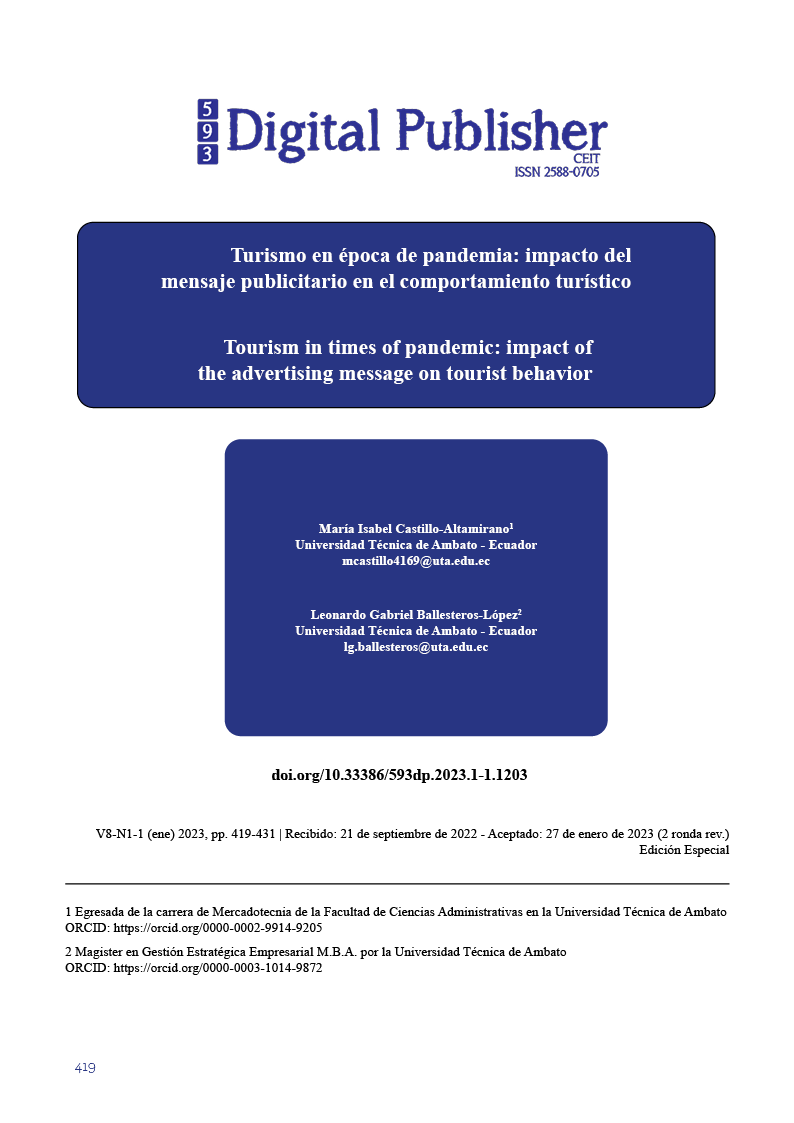Turismo en época de pandemia: impacto del mensaje publicitario en el comportamiento turístico
Main Article Content
Abstract
The Covid-19 pandemic affected the tourism sector, this situation caused the total or partial suspension of its offer and destinations, this generated changes in the behavior of tourists, who are more sensitive to advertising messages. The objective of this study was to propose an effective communication strategy in the present situation of tourism in times of pandemic. The methodology used was quantitative, because it allowed the collection of information to develop the instrument for data collection, in which the statistical analysis was carried out by means of the non-parametric statistical test of chi-square in which the existing relationship between the advertising message and tourist behavior was demonstrated. The result showed that advertising influences the purchase of tourism services. It is concluded, that the communicational strategies have greater influence on Facebook and Instagram platforms, since, they show greater benefits when socializing content digitally
Downloads
Article Details

This work is licensed under a Creative Commons Attribution-NonCommercial-ShareAlike 4.0 International License.
1. Derechos de autor
Las obras que se publican en 593 Digital Publisher CEIT están sujetas a los siguientes términos:
1.1. 593 Digital Publisher CEIT, conserva los derechos patrimoniales (copyright) de las obras publicadas, favorece y permite la reutilización de las mismas bajo la licencia Licencia Creative Commons 4.0 de Reconocimiento-NoComercial-CompartirIgual 4.0, por lo cual se pueden copiar, usar, difundir, transmitir y exponer públicamente, siempre que:
1.1.a. Se cite la autoría y fuente original de su publicación (revista, editorial, URL).
1.1.b. No se usen para fines comerciales u onerosos.
1.1.c. Se mencione la existencia y especificaciones de esta licencia de uso.
References
Augusto, F., & Soto, D. (2022). Patrimonio cultural inmaterial y turismo. Análisis de la producción científica publicada en revistas iberoamericanas de turismo. Revista Investigaciones Turísticas(23), 112-139. doi:https://doi.org/10.14198/INTURI2022.23.6
Bricio, K., Calle, J., & Zambrano, M. (2018). Digital marketing as a tool for labor performance in the Ecuadorian Environment: Case study of graduates from the University of Guayaquil. Revista Universidad y Sociedad, 10(4), 103-109.
Calderón, M., & Jaramillo, I. (2019). Mensaje político y efcacia electoral: microsegmentación en redes sociales en las elecciones seccionales de Quito. Democracias, 7, 179-210.
Castillo, F., & Guerra, P. (2021). Gestión turística para la reactivación del sector hotelero de la parroquia San Lorenzo del cantón Manta, Post Pandemia Covid-19. Serie Científica de la Universidad de las Ciencias Informáticas, 14(12), 147-165.
Crespo, J., & Soria, W. (2019). Factores que influyen en el comportamiento del turista: estado de la cuestión. Kalpana, 131.
Dorado, F., Solís, M., & Cruz, V. (2021). Alternativa metodológica Pos-COVID-19 para la construcción de un indicador sintético adelantado. Economía y desarrollo 165(1).
Félix, Á., & García, N. (2020). Estudio de pérdidas y estrategias de reactivación para el sector turístico por crisis sanitaria COVID-19 en el destino Manta-Ecuador. Revista Internacional del Turismo, Empresa y Territorio 1(1), 79-103. https://doi.org/10.21071/riturem.v4i1.12718.
Fernández, F. (2019). La comprensión del mensaje publicitario y la protección de la voluntad del consumidor desde el derecho a la información (Corte de Apelaciones de Santiago). Revista de Derecho (Valdivia), 32(2), 339-345. doi:http://dx.doi.org/10.4067/S0718-09502019000200339
GAD. (2019). Agenda Tungurahua. Revista Gobierno provincial de Tungurahua, 4.
Garcia, A. (2020). Una visión crítica del turismo en tiempos pre- y poscovid-19:“turismofobia” en fahrenheit 451 de ray bradbury. Congreso Virtual Internacional Turismo y Desarrollo, 179-191.
Hughes, C., Swaminathan, V., & Brooks, G. (2019). Impulsar el compromiso con la marca a través de personas influyentes en las redes sociales en línea: una investigación empírica de campañas de blogs patrocinados. 83(5), 62-79. doi:https://doi.org/10.1177/0022242919854374
Korstanje. (2020). COVID19, El Turismo en un Mundo Incierto: desafíos para el siglo XXI en un contexto post. Anais Brasileiros De Estudos Turísticos , 10, 1-11. doi:https://doi.org/10.34019/2238-2925.2020.v10.31397
Llugsha, V. (2021). Turismo y desarrollo desde un enfoque territorial y el covid-19. Quito: Abya Yala.
Menchero, M. (2020). Flujos turísticos, geopolítica y COVID-19: cuando los turistas. Geopolítica Revista de estudios sobre espacio y poder,11(especial), 106 https://doi.org/10.5209/geop.69249.
Olmedo, E., & Poveda, F. (2021). “El uso de las TIC en las experiencias de vacaciones poscovid: caso travelink”. Quática Ciencia con impacto social, 2(1), 63-78.
Pérez, E. (2019). Análisis del mensaje publicitario. Ámbitos. Revista Internacional De Comunicación(44), 248-251. doi:https://doi.org/10.12795/Ambitos.2019.i44.15
Presol, Á., & Rodríguez, L. (2021). Mensajes publicitarios en productos de alimentación. Análisis comparativo de colacao y nesquik. Revista de Comunicación de la SEECI, 54, 1-16. doi:. http://doi.org/10.15198/seeci.2021.54.e638
Ramírez, A., & Arias, S. (2021). Efecto de la responsabilidad social corporativa en la reputación de las organizaciones: una revisión sistemática. Revista Universidad y Empresa, 23(40), 1-25. doi:https://doi.org/10.12804/revistas.urosario.edu.co/empresa/a.8859
Salas, E. (2018). El tono del mensaje en la construcción de la imagen de marca. Revista Caribeña de Ciencias Sociales, 25.27.
Toledo, M. (2021). Estrategias post-COVID 19 para reactivar el turismo local en el Ecuador: Caso provincia de Tungurahua. Green World Journal 4(1), 3.https://www.greenworldjournal.com/doi-v4-n1-003-gwj-2021.
Toledo, M. (2021). Estrategias post-COVID 19 para reactivar el Turismo local en el Ecuador: Caso provincia de Tungurahua. Green World Journal, 4(1), 1-12. Obtenido de https://www.greenworldjournal.com/doi-v4-n1-003-gwj-2021
Vallejo, A., & Álvarez, J. (2022). Impacto del Covid-19 en la demanda turística de la Reserva de Producción de Fauna Chimborazo. Revista de Ciencias Humanísticas y Sociales (ReHuSo) vol.7 no.1, 33-39. https://doi.org/10.5281/zenodo.5814052.
Zumbana, J. (2021). El marketing digital para la reactivación del turismo. Título de Licenciada en Hoteleria y Turismo. Ambato: Universidad Técnica de Ambato. Repositorio institucional de la UTA. https://repositorio.uta.edu.ec/jspui/handle/123456789/32681.



